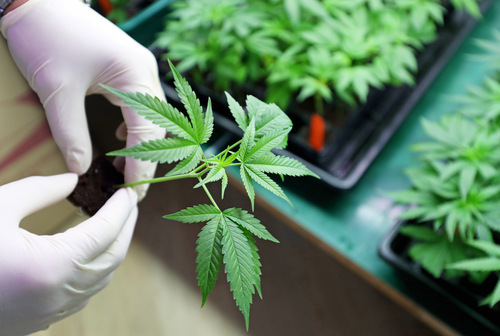Cannabidiol Found to Reduce Anxiety-induced Tremors in Parkinson’s Patients, Study Shows

A single dose of cannabidiol (CBD) can decrease anxiety and tremor strength in people with Parkinson’s disease during situations known to induce anxiety, such as a public speaking exercise, a study found.
The results of the study, “Effects of acute cannabidiol administration on anxiety and tremors induced by a Simulated Public Speaking Test in patients with Parkinson’s disease,” were published in the Journal of Psychopharmacology.
Cannabidiol — and the different molecules found in the Cannabis sativa plant — has attracted much attention since its widespread legalization. One of the main components of the plant, CBD does not have psychoactive properties, unlike tetrahydrocannabinol (THC), the main hallucinogenic component of cannabis.
It does have anxiolytic, or anxiety-reducing properties.
Given that, and due to its anti-inflammatory and neuroprotective properties, CBD has been studied for use in a number of conditions, namely epilepsy — where it is approved to treat certain types of the disorder — inflammatory diseases, cancer, psychiatric disorders, and neurodegenerative diseases.
CBD also has been tested in a number of anxiety studies and has previously been shown to decrease anxiety in healthy volunteers. Now, researchers tested the potential of CBD as an anti-anxiety treatment for people with Parkinson’s.
In addition to motor symptoms, such as tremors and freezing, Parkinson’s also is characterized by several non-motor symptoms, including anxiety. Around 67% of people with the neurodegenerative disease have reported this symptom, with anxiety-inducing situations aggravating their Parkinson’s tremors.
The anxiety treatments currently available, such as selective serotonin inhibitors — the most commonly prescribed antidepressant — and benzodiazepines, have side effects which aggravate Parkinson’s symptoms.
The researchers say better options without side effects are needed for treating anxiety, especially in the elderly and in this particular patient population.
So far, cannabidiol has been described as safe, and seems to have very few side effects, making it a good prospective treatment option. However, scientists say more studies are necessary to evaluate CBD, as it is crucial to confirm that the treatment does not interact with other parkinsonian medications.
To learn more, a team of Brazilian researchers conducted a clinical trial in which 24 people with Parkinson’s disease, mean age 64.13 years, took a single, 300 mg dose of CBD or a placebo 90 minutes before being asked to do a public speaking test. This is a common way of inducing anxiety in an experimental setting. The participants had to give a talk on a subject such as “transportation in their city” and were recorded while doing so. They were told that the videos would be analyzed by a psychologist.
The participants all reported the onset of Parkinson’s symptoms after age 50, and had a mean disease duration of 6.5 years. Most individuals were taking levodopa (19 patients) as well as other medications.
All of the patients took part in two experimental sessions within a 15-day interval, during which their blood pressures, heart rates, tremors, and moods were measured at different time points.
The scientists found that the amplitude of tremors was significantly lower in patients who received cannabidiol compared with placebo — and CBD also significantly reduced the anxiety level. There were no differences in any of the other measurements between the CBD and placebo groups.
“These observations suggest that CBD may be an alternative treatment for patients with PD and anxiety,” the researchers said.
CBD’s mechanism of action is not well-understood, since it has many different targets in the brain. Two targets, serotonin 1A receptor (5-HT1A) and cannabinoid receptor type 1 (CB1), have previously been linked to anxiety. As such, the researchers said the interaction of CBD with 5-HT1A and CB1 could in part explain how the compound might be working.
The investigators noted that the study has several limitations. One was its small size — only 24 people participated, 22 of whom were men. In addition, the speaking test was done just 90 minutes after taking CBD. More time might have been needed to see the full effect of the treatment, they noted. The study also lacked active comparators for CBD, such as other anti-anxiety therapies.
Despite these drawbacks, the initial results are promising enough to warrant further investigation into how CBD works in the brains of Parkinson’s patients, the researchers said.
“This is the first study that shows the anxiolytic effects of CBD in patients with PD and its ability in attenuation of the tremor amplitude in anxiogenic situations,” they said.
The investigators suggest future experiments should include more patients and different doses of cannabidiol, for example, having participants take CBD every day instead of in a single dose. Further research is necessary to confirm the calming effects of CBD and what quantity and frequency is optimal for the best results in people with Parkinson’s, they said.






